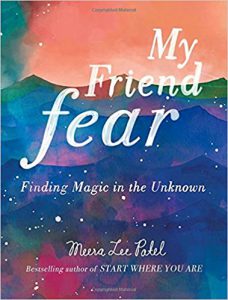 Illustrator and writer Meera Lee Patel describes why she began painting soon after she began working a day job:
Illustrator and writer Meera Lee Patel describes why she began painting soon after she began working a day job:
“I started painting as a way to find myself, as a way to remind myself of who I was when I was a little bit happier. Who I was when I was making things. When I started painting, I felt so connected to myself and felt connect to other living things, just by being somebody who was making something from nothing and putting it out in the world. I decided that is what I wanted to do.”
In my latest podcast interview, Meera and I dig into her journey as an artist, and how she made a profound creative shift to become a full-time artist and writer.
You can listen to the podcast by clicking ‘play’ below, or in the following places:
 Her latest book, My Friend Fear, is an amazing work that turns fear into something beautiful.
Her latest book, My Friend Fear, is an amazing work that turns fear into something beautiful.
In our discussion we cover some deeply important topics for any artist or writer:
- The specific ways that her parents and her high school gave her permission to create, even as they also instilled a clear sense of responsibility.
- How she devoted 40 hours per week to her craft, on top of her 40 hour per week day job. When I asked how she approached painting on the side, her answer was immediate: “”Aggressively. Super aggressively. I did not care about anything else. I worked all the time.”
- She describes how she found clarity and focus, and the specific steps she took to invest in her craft, earn money for it, and try new things.
- When success seemed distant and she considered giving up, this is how she stayed on track: “I always thought, ‘have I exhausted every possibility?’ There was always something I hadn’t tried. That meant there was always the possibility for me to try, so I always took that possibility, even when I didn’t want to.”
- We discuss the importance of money to artists and writers. How she frames it: “Its really important to have a sustainable business so you can have the luxury and the freedom to not have to compromise your art.”
- How she found success not through a big break, but many small moments of success: “I will say that nothing has ‘taken off.’ I have had small moments, but my whole trajectory has been very slow, very steady and very incremental. A lot of slow growth. That is frustrating as the person who is in it. It’s probably frustrating for listeners because nobody wants to hear that. But it is dependable to know that you can always take a tiny step forward each day each week and eventually you will be somewhere new because you took all of those small steps.”
- How social media is both a wonderful gift, but also an incredible challenge. She describes how, the more successful she becomes, the more complex her relationship to social media is because there are so many expectations placed upon her. How she navigates it: “Social media is responsible for making me that accessible to the world. I’m realizing that I’m going to have to have the limits and boundaries if I’m going to keep making the work.”
- When I asked her if she deals with comparisonitis, she replied, “It is an absolute daily struggle… You have to push it aside and make the work you want to make.”
- She talks about the turning point for no longer ruling her life by fear. She says: “Being scared is not a good enough reason to do things.”
You can find Meera in the following places:
Her books:
- My Friend Fear: Finding Magic in the Unknown
- Start Where You Are: A Journal for Self-Exploration
- Made Out of Stars: A Journal for Self-Realization
As well as:
Her Etsy shop.
Her website: https://www.meeralee.com
Instagram: @merelymeeralee
Twitter: @meeralee
Facebook
Thank you!
-Dan
Podcast: Play in new window | Download
Subscribe: RSS
